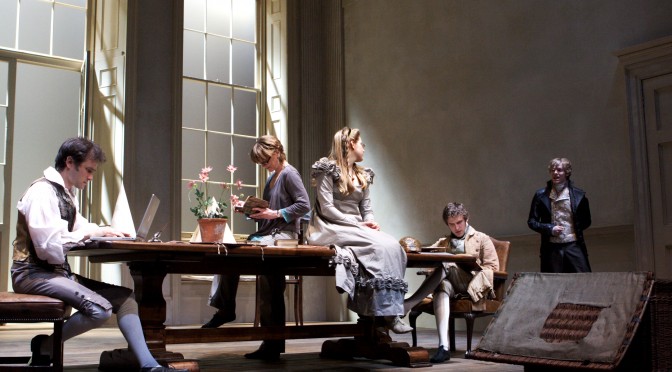If there is one thing in the theatre world everyone can agree on, it is that Tom Stoppard is clever. He knows a lot about a lot and is good at explaining complicated things that leave the rest of us baffled.
The subject matter of Arcadia is a case in point – a heady brew of landscape gardening, literary studies and physics, played out in one room with alternate acts set in the 18th century and modern times. A rich mix, indeed, and one that potentially overwhelms.
The cleverest thing about Stoppard is that he manages to get the audience not just understanding these subjects but also caring and laughing about them.
Credit goes to the cast. Dan Stevens plays the charismatic tutor Septimus Hodge . His role is to explain 18th-century arts and science to both the audience and his prodigious pupil Thomasina Coverly . A painful desire for his mistress Lady Croom is complicated by a touching flirtation with his pupil, and he conveys not just a passion for his studies but also a great sexual presence. Both women, Jessica Cave and Nancy Carroll respectively, present their characters with fitting complexity and make the most of Stoppard’s wonderful ear for period language to great comic effect.
In the present day, the explaining is done by mathematics student Valentine (Ed Stoppard). His brooding presence is so intense as to be unlikeable, and his irritation over the supposed simplicity of iterated algorithms sounds false. This time, explication is for the benefit of the audience and Samantha Bond ’s historian, whose performance becomes inexplicably shrill.
The love triangle in modern times is completed by rival academic Bernard Nightingale , a morally distasteful character portrayed by Neil Pearson, who has surely paid far too much attention to one textual reference about his bouncing around.
Through science and art these two worlds come together. Thomasina’s brilliance foresees the great mathematical discoveries Valentine is working on. Both historians retrace events concerning the earlier set of characters.
But, despite its humour, Arcadia is a melancholy work with a gentle sense of tragedy. The mathematics aren’t understood in the 18th century – with disastrous consequences. Both historians are blinded by their ambition for either professional advancement or to prove an ideological point and make mistakes about what really happened in the past. Attempts to created a paradise garden on earth or to explain that earth with a grand Theory of Everything are inevitably doomed to failure .
Despite all the laughs, destruction seems to be the only outcome of our investigations. What hold us are those brief moments of joy along the way – the journey through Arcadia rather than the place itself.
Until 12 September 2009
Photo by Catherine Ashmore
Written 8 June 2009 for The London Magazine

